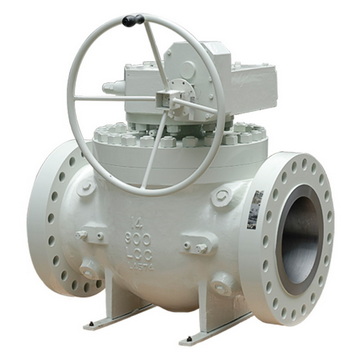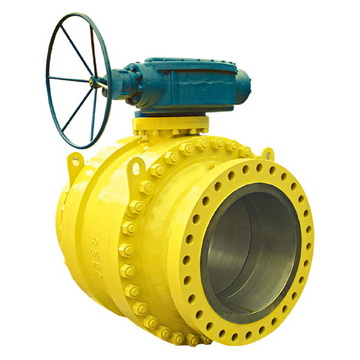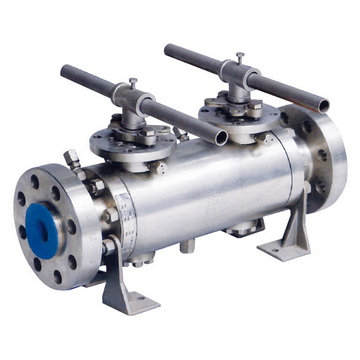Best Metal Seated Ball Valves for Abrasive and Corrosive Environments
Content Menu
● What is a Metal Seated Ball Valve?
● Why Choose Metal Seated Ball Valves for Abrasive and Corrosive Applications?
>> Superior Wear and Abrasion Resistance
>> High Temperature and Pressure Capability
>> Enhanced Corrosion Resistance
>> Reliable Seal and Leak Prevention
>> Cost Efficiency Over Lifecycle
● Our Range of Metal Seated Ball Valves
>> Trunnion Mounted Ball Valves (Ear Shaft Ball Valves)
>> Top Entry Ball Valves (Top Insertion Type)
● Applications of Metal Seated Ball Valves
>> Seawater Desalination Plants
>> Chemical and Petrochemical Industries
● Key Features and Benefits of Our Metal Seated Ball Valves
● Maintenance and Longevity of Metal Seated Ball Valves
● How We Support OEM Customization
● Frequently Asked Questions (FAQ)
>> 1. What distinguishes a metal seated ball valve from a soft seated ball valve?
>> 2. Can metal seated ball valves be used in offshore environments?
>> 3. What industries benefit most from metal seated ball valves?
>> 4. How does the floating ball design improve valve performance?
>> 5. Do you offer custom OEM services for metal seated ball valves?
When controlling the flow of aggressive and challenging fluids in harsh industrial settings, metal seated ball valves stand as one of the most reliable and durable options available. Designed specifically to meet the stringent demands of abrasive and corrosive environments, these valves deliver consistent performance, high sealing integrity, and extended service life where traditional soft-seated valves would fail prematurely.
From the oil and gas upstream, midstream, and downstream sectors to offshore drilling platforms and seawater desalination plants, metal seated ball valves play an indispensable role in optimizing process safety and operational efficiency.

What is a Metal Seated Ball Valve?
A metal seated ball valve differs from conventional ball valves primarily in the material of the sealing surfaces. While typical ball valves utilize soft seats made of polymers such as PTFE or elastomers, metal seated ball valves replace these with hardened metal-on-metal contact surfaces. Common materials for the seats include stainless steel alloys, cobalt-based alloys like Stellite, and other specially treated metals engineered to provide superior resistance against wear, corrosion, and high temperatures.
The valve consists of several key components: the spherical ball which controls the flow, the valve body housing, and the seats held in place to provide sealing surfaces against the ball. Because the seats are metal, the valves can tolerate rough fluid streams containing abrasive particles, high pressure differentials, and elevated temperatures that often cause soft seats to warp, erode, or leak.
Why Choose Metal Seated Ball Valves for Abrasive and Corrosive Applications?
Superior Wear and Abrasion Resistance
In industries such as oil and gas production and chemical processing, fluids moving through pipelines often carry sediments, sand, sulfides, and other abrasive materials. Soft seats get damaged quickly under these conditions, leading to frequent replacements and shutdowns. Metal seated ball valves are engineered to withstand this abrasive impact and maintain tight sealing performance over extended periods, significantly lowering maintenance frequency and operational costs.
High Temperature and Pressure Capability
Unlike soft-seated counterparts, metal seats retain their dimensional stability over wide temperature ranges and high pressures. This makes them ideal for high-pressure gas and steam lines, where temperatures can soar beyond the limits that polymer seats can bear without deformation.
Enhanced Corrosion Resistance
Exposure to seawater, acids, gases, and other corrosive fluids can induce rapid deterioration of valve components if not properly designed. Metal seated ball valves use corrosion-resistant alloys carefully selected to resist chemical attack, pitting, and erosion, especially in harsh offshore and chemical plant environments.
Reliable Seal and Leak Prevention
Despite concerns that metal-to-metal contact might sacrifice sealing quality, modern manufacturing precision and surface treatments ensure that metal seated ball valves achieve bubble-tight closure. Many designs incorporate self-aligning seats or floating ball mechanisms that enhance sealing capability and compensate for wear over time.
Cost Efficiency Over Lifecycle
Though the initial investment in metal seated ball valves may be higher compared to soft-seated types, the extended service life, reduced downtime, and lower maintenance expenses justify this cost in aggressive environments by enabling more predictable and efficient operations.
Our Range of Metal Seated Ball Valves
Our factory offers a wide spectrum of metal seated ball valves engineered to meet the exacting standards across varied industries:
Floating Ball Valves
Floating ball valves feature a ball that is not fixed but supported by the seats, allowing slight lateral movement. This design pushes the ball against the downstream seat, enhancing sealing pressure when the valve closes. Floating ball valves are particularly effective for services involving moderate pressure and abrasive media, providing reliable shut-off while accommodating pressure fluctuations.
Trunnion Mounted Ball Valves (Ear Shaft Ball Valves)
Trunnion mounted designs secure the ball via trunnion shafts, relieving the seats from excessive load and making these valves suitable for higher pressure and larger diameter pipelines. The trunnion support prevents unwanted ball movement and reduces operational torque, facilitating stable sealing even in challenging fluid conditions.
Top Entry Ball Valves (Top Insertion Type)
Top entry ball valves allow internal maintenance by removing the bonnet without disconnecting the pipeline, making them highly valuable in offshore drilling platforms and critical process lines where downtime must be minimized. This design expedites seat replacement, ball inspection, and seal refurbishment, optimizing maintenance cycles.

Applications of Metal Seated Ball Valves
Oil and Gas Industry
In all stages of petroleum operations—from exploration and extraction through refining and transport—metal seated ball valves ensure regulated flow of hydrocarbon fluids laden with sand, sulfur, and other contaminants. The valves' ability to resist sour gas corrosion and endure high mechanical stresses makes them indispensable for upstream wellheads and downstream refining units alike.
Offshore Platforms
Metal seated ball valves are engineered to resist the corrosive nature of seawater and harsh marine atmosphere. Their strength and sealing reliability prevent leaks that could otherwise jeopardize safety and create environmental hazards on offshore rigs and subsea systems.
Seawater Desalination Plants
These facilities expose valves to highly corrosive saltwater and brine streams. Metal seats made from high-grade nickel alloys provide corrosion protection while maintaining tight shutoff, crucial for operational continuity.
Chemical and Petrochemical Industries
Various acids, solvents, and chemical vapors rapidly degrade soft valve materials. Metal seated ball valves offer the chemical resistance and mechanical durability required for safe handling and precise process control in chemical reactors and pipelines.
Key Features and Benefits of Our Metal Seated Ball Valves
Our valves boast advanced engineering and premium materials ensuring:
- Hardened metal seats to resist abrasion and corrosive chemicals for prolonged valve life.
- Robust body materials such as stainless steel and duplex alloys for structural strength.
- Precision machining combined with special surface coatings to minimize friction and wear.
- Wide pressure and temperature range capability tailored to operational requirements.
- Customizable designs supporting OEM production for international clients demanding unique specifications.
- Compliance with international standards including API, ISO, and ANSI for quality assurance.
Maintenance and Longevity of Metal Seated Ball Valves
While metal seated ball valves provide excellent durability, routine inspections optimize performance and safety:
- Scheduled examination of sealing surfaces helps detect early signs of wear or pitting.
- Lubrication of moving parts ensures smooth operation and prevents galling.
- Cleaning protocols reduce buildup of abrasive deposits that could increase valve torque.
- Non-destructive testing methods, like ultrasonic or dye penetrant inspections, verify seat integrity without disassembly.
Correct installation is equally vital; operators should ensure proper alignment, adherence to torque guidelines, and material compatibility with pipeline systems to avoid premature valve failure.
How We Support OEM Customization
Understanding that clients across the globe require tailored valve solutions, our factory offers full OEM services. Customers can specify design parameters, alloy selection, pressure ratings, and connection types to match individual project needs. Our skilled engineering team collaborates closely with clients to ensure the metal seated ball valves meet exact performance criteria, including manufacturing process transparency, rigorous testing, and compliance documentation.
Conclusion
In industries challenged by abrasive particles and corrosive fluids, choosing the right valve is critical. Metal seated ball valves deliver the durability, corrosion resistance, and seal integrity necessary for operational excellence in the most demanding industrial scenarios. Their robust design adapts to upstream and downstream oil and gas applications, offshore platforms, seawater desalination, and aggressive chemical processing environments.
By partnering with a factory specializing in high-quality metal seated ball valves and OEM services, you gain access to customized solutions that maximize safety, efficiency, and cost-effectiveness. Protect your valuable assets and ensure seamless production continuity with our premium metal seated ball valves engineered for harsh environments.
Contact us today to discuss your requirements and explore how our expertise and product range can add value to your projects.

Frequently Asked Questions (FAQ)
1. What distinguishes a metal seated ball valve from a soft seated ball valve?
Metal seated ball valves feature hardened metal seats that resist abrasion, corrosion, and high temperatures, unlike soft seats made from polymers that degrade faster in harsh service conditions. Metal seats offer longer durability in abrasive and corrosive environments.
2. Can metal seated ball valves be used in offshore environments?
Yes, metal seated ball valves are ideally suited for offshore applications due to their corrosion-resistant alloys and mechanical robustness that withstand seawater exposure, high pressures, and temperature variations typical of marine settings.
3. What industries benefit most from metal seated ball valves?
Industries such as oil & gas extraction, petrochemical processing, offshore drilling, seawater desalination, and chemical manufacturing rely heavily on metal seated ball valves to handle abrasive and corrosive fluids safely.
4. How does the floating ball design improve valve performance?
Floating ball valves allow the ball a slight lateral movement to press firmly against downstream seats, ensuring enhanced sealing under pressure fluctuations and abrasive flow conditions.
5. Do you offer custom OEM services for metal seated ball valves?
We provide comprehensive OEM services, customizing valve designs, materials, sizes, and performance features to meet the specific needs of international manufacturers, traders, and end-users.
Hot tags: Best Metal Seated Ball Valves for Abrasive Environments, Metal Seated Ball Valves for Corrosive Environments, Durable Metal Seated Ball Valves for Abrasive Materials, High Performance Metal Seated Ball Valves for Corrosive Use, Metal Seated Ball Valves for Harsh Environments, Abrasive Resistant Metal Seated Ball Valves, Corrosion Resistant Metal Seated Ball Valves, Choosing Metal Seated Ball Valves for Abrasive Conditions, Top Metal Seated Ball Valves for Harsh Chemical Environments, Metal Seated Ball Valves for Extreme Wear and Corrosion